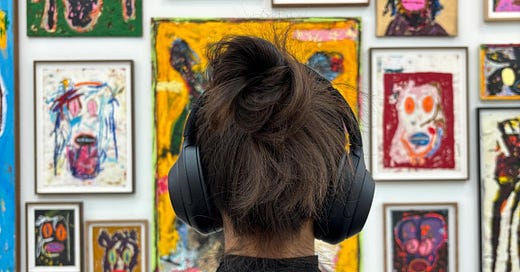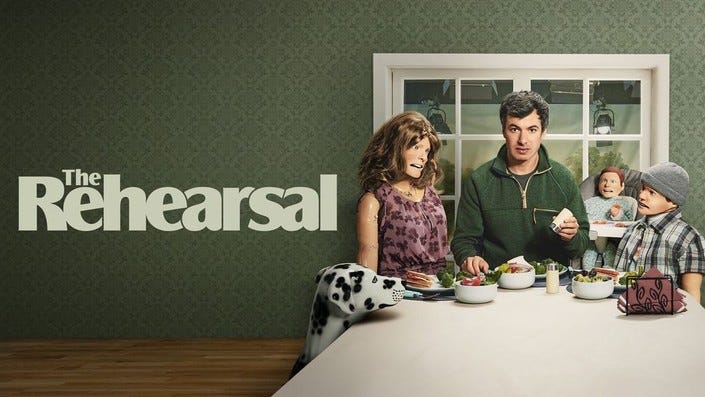The Rehearsal is the Real Thing
From Social Scripts to Survival Tools: What ND Minds Already Know
Most evenings, I find myself walking around the house having conversations with people in my head, ignoring the dishes, pacing between rooms in rhythm with music 🎧, testing how different contexts and scenarios feel in my body. In between the spaces of the day, I‘d say I rehearse between 200 to 1000 conversations.
They are often in the background of my mind whilst I am out walking (and ironically in between talking), sometimes silently, out loud, some for today or in a few months (and sometimes years). The trick is to keep your eyes straight, focused, smile gently, and no one seems to know. 👀
Like a pinball waiting to land, scenarios rattle across my gaze until they reach a point of convergence - a knowing, and settling until a quiet confidence precipitates that readies me for anything. It’s sort of like an internal warm-up while I’m working something out, often in the ‘in-between’ moments of my day, where the darkness of thought often appears. Like Freddie Mercury in the Bohemian Rhapsody film, many others find these moments “intolerable”, where “all of the darkness you thought you left behind comes creeping back in”.
This is often seen as a cold, lonely place where many face internal struggles, even demons. But, for me, this is a pace I find most peace where I can relive, learn, and reflect on situations with a deep introspection. I enjoy its voices, where I find relief in reloading. I love the terror and thrill of internal feedback that, over time, creates a smoothness of thought, like ice cream in a UK heat wave. 🍦
Much like many people with ADHD, I think through movement, and like many autistic people, I process through repetition and simulation.
In practising social transitions, I feel a physical pull to practise interactions. Be it asking someone for help, picking up groceries, or saying hi to strangers who are on the verge of becoming friends/colleagues. Do I hug? Do I wave? Do I look them in the eye? Are they like me and would prefer neither, much like when passing a fellow dog walker you see every day?
This embodiment may look like an involuntary delusion or absence of thought, but it’s an intentional rehearsal that requires a flow-like balance (especially when done in your weekly dancercise classes..🙃). A bit like practising the piano, cycling downhill, or waving your phone in the air in search of a signal. It’s oddly soothing, and not to mention addictive.
Turns out, it isn’t just me.
Which is why I am slightly obsessed with this new TV show.
Enter: The Rehearsal
Nathan Fielder’s The Rehearsal is one of the best on-screen portrayals I’ve seen of this process. The concept is simple: give people a chance to rehearse real-life situations - awkward conversations, major decisions, or social uncertainty - and see how they cope. Amongst the genius-like determination to create replicas of workplaces, bars and houses, what unfolds is so surreal you will find it both ridiculous yet deeply familiar.
He highlights the need to simulate, to model behaviour, and anticipate risk, as a form of preparedness, which myself and many neurodivergent (ND) people were so ready for. The effort and sincerity he places in creating replica environments are equally refreshing, indulgent and admirable.For instance, in the latest series, Fielder explores how communication between copilots affects flight safety. The episode includes a simulation of a pilot’s life - from baby to grown man - to figure out what led him to land safely in the Hudson River, unlike other pilots whose flights ended in fire and not water.
As Sam Rosenberg writes in Consequence in 2022, The Rehearsal season 1 mirrors the experience of masking -when autistic individuals suppress their traits to fit into neurotypical environments.
“This is essentially what each person in The Rehearsal is asked to do,” he writes. “Act out social scripts and embody certain roles over and over again, to create a better sense of predictability and eliminate as much collateral damage as possible.”
He also points out that masking often comes at the cost of our humanity. It robs us of the space to be messy, awkward, or authentically unsure, just to make others feel more comfortable.
Fielder may have the budget for full sets and props, but many of us do this kind of rehearsal every day, without the camera crew. It also helps to make sense of why we love routine, and replay the same song daily until the next epoch of experimentation. “These controlled environments essentially guide people to avoid mistakes with real consequences, while maintaining an illusion of verisimilitude.”.
Rehearsal helps with navigating conversations:
1) Anticipating how we feel 💥
2) Gauging how others might respond 🧐
3) Build in contingencies when things go sideways. ⇔
You see, perhaps practising that Brits Awards acceptance speech in the shower holds more weight than you think. 🚿 🏆
Rehearsal in Education: A Quiet Superpower
Rehearsal isn’t just helpful - it’s essential for neurodivergent (ND) learners. In education, it supports far more than academic achievement; it helps ND students navigate the how of learning: how to enter a room, ask a question, or transition between emotions and tasks. We’re not just learning facts -we’re decoding context needed to make decisions as micro-transitions in the moment are hard. We need to a second (ok, 6 seconds) to reconfigure. 🏗️
You might ask, “Why bother? There’s no crisis.” But rehearsal isn’t about reacting to emergencies 🚨. It’s about building fluency in the everyday soft powers of hard conversations, creating muscle memory for navigating nuance and playing out scenarios to see how you feel about it.
What Works in Practice:
Visual cues and written instructions ✍🏽
Role-play of high-stakes or emotional scenarios ✨
Modularising tasks into scripts or routines 🧱
Debriefs after interactions to process meaning 💡
External processing - what I call spillage conversations - to think out loud and make sense of the moment. 🫧
This scaffolding of the learning experience gives ND students the structure to interpret, respond, and take agency in real-time. With the right support, and just talking it through, I can decide on things in minutes and hours or instead of months ⏰. There is even a big body of supporting research that shows theatre-based interventions to improve social and communication skills in autistic children and adults, along with SENSE Theatre programs, which demonstrate building self-confidence through rehearsal and performance. If this is a bit of you, then please watch Blythe Corbett’s TED talk!
By embodying these soft skills, we are also expanding the narrow perspectives that are often a consequence of 'traditional problem solving and the obsession with the “doing mode”, as MIT Sloan Management Review mentions, often overlooking important details.
What We Could Unlock 🗝️
We need to lean into such creative pursuits to not only encourage a more expansive and considered school of thought, but also to ‘invite people to step into different roles and scenarios and experiment with alternative behaviours.’ Not just as a side dish, but actually “embedded into the day-to-day activities”. For example, the use of improvisation, art, or forum theatre helps people to bridge the thinking and doing modes, rendering a more thoughtful practice leading to “better collaboration and decisions”.Make the learning experience immersive, and relevant to problems and interactions we face everyday.
It may sound simple: helping someone rehearse. But once we unlock this ‘basic’ act, we begin to see just how powerful it is - not just in oracy, but in confidence through preparedness and acting on cue. Rehearsing with neurodivergent minds in mind reveals the hidden gaps in our systems - holding up a mirror to those quiet barriers others have learned to ignore. Therefore, by practising neuro-affirmative learning, we create environments that are clearer, kinder, putting humans and real interactions centre stage for every neurotype.
Ironically, in this light, rehearsal becomes more than preparation or practice, but a form of redesign, preparing different minds to be part of the conversation and not just spoken for. No doubt in time, they will be the ones asking the difficult questions.
Thanks for reading ‘Dates with Divergence’ 🚀 I’d love to hear your thoughts - feel free to like, comment, and share your own pivot stories. Let’s keep the conversation going - drop your thoughts, share your pivots, and stay tuned for more. ✉️








I like it !! x